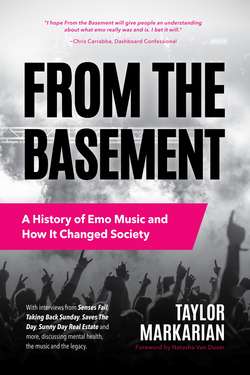Читать книгу From the Basement - Taylor Markarian - Страница 9
На сайте Литреса книга снята с продажи.
ОглавлениеIntroduction
What the fuck is emo?
This is a question that many have agonized over and continue to agonize over. Most of the bands that have been canonized as emo don’t claim the term and, even better, don’t even know what it means. So how am I to write a complete and compelling history of emo music when half of the heroes of the genre spend their time pointing fingers at someone else and saying, “Our band wasn’t emo, that band was emo”?
“You set yourself a challenging task,” Chris Simpson, the vocalist and guitarist of Mineral, said to me.
Indeed I have, which is why what you are about to read is as much a comedy of errors as it is a serious attempt to encapsulate a time in rock history for posterity. But through all of this confusion, what I have concluded is that nobody can agree on one definition of emo because there is no single definition; rather, there are multiple.
The first wave of emo influencers in the mid 1980s and the bands that followed in the mid-to-late ‘90s weren’t emo in the same way that mainstream music listeners think of bands such as My Chemical Romance, Fall Out Boy, or Panic! At the Disco (who are actually more alternative, pop rock, or indie in terms of sound). That’s because the meaning of the word has shifted and has remained ambiguous over time. From Rites of Spring to The Promise Ring to American Football to Sunny Day Real Estate to Jimmy Eat World, the word “emo” has amassed quite a reputation. The soundscapes bands such as these created the musical elements that would soon be classified as emo: personal and vulnerable lyrics, a combination of the edginess of punk and hardcore with pop sensibilities and catchy melodies, and variations in tone and tempo from slow, minimalistic, and melancholic to aggressive, upbeat, and whiny (in the best possible way, of course).
At the turn of the millennium, bands like Brand New and Taking Back Sunday took the basics of ‘90s emo and developed more of a flair for the dramatic. This new kind of emo developed a style, as does almost any genre, from hip-hop to heavy metal. Increasingly, emo became known as a fashion and lifestyle choice. The emphasis on this new visual aesthetic is what ultimately broke through to mainstream music and television. My Chemical Romance would become the poster boys for the mainstream’s vision of emo, when, really, this was the turning point that many earlier emo bands point to as the downfall of the genre.
Then there is simply the word itself: “emo,” short for “emotional.” This may be the most confusing point of all, for what kind of decent music is not emotional? What kind of good jazz or punk or classical music does not make the listener feel something? Music is inherently emotional. Yet, there was something about this set of sounds and this set of bands during this set of years that warranted the name more than any other.
It is the purpose of this book to discover what that something is. What was it that made emo so popular, yet so open to ridicule? What was it about emo that had fans claiming it saved their lives? This book aims to give as extensive and thorough answers to these questions as possible. It also aims to make the point that this genre is worth such an effort to portray in its entirety, for there are many who don’t think emo is a substantial enough genre to earn a place in rock history. In fact, as I type this, spellcheck insists with its red dotted lines that there is no such word as “emo.” So fuck whoever thinks they are too good for this. Fuck the pretentious critics and the computer software that don’t recognize the emo movement and its significance.
Emo is significant. It is significant because of every girl in a Get Up Kids T-shirt and every boy who broke up with her. It is significant because of the bonds it made and the suicidal hands it stayed. It is significant not only for the way it sounded, but also for the way it made us feel. And ultimately, it is most significant to the current culture of openness about mental health, as it aids us to connect with one another at last.
